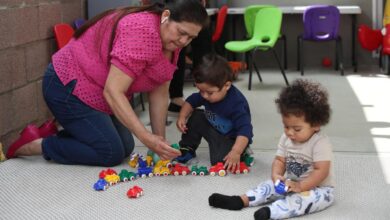
Early childhood education lays the groundwork for a child’s future academic success and personal development. At the heart of this foundational phase lies play—a fundamental and potent tool that shapes a child’s learning experiences. Let’s delve into the significance of playful foundations in early childhood education:
The Importance of Play in Learning
Play is the primary mode through which young children learn and make sense of the world. It fosters curiosity, creativity, problem-solving, and social skills, providing a holistic approach to learning.
Play-Based Learning vs. Traditional Approaches
Play-based learning differs significantly from traditional didactic approaches. It encourages active engagement, exploration, and hands-on experiences rather than rote memorization or passive learning.
Developmental Domains and Play
Play influences various developmental domains. It enhances cognitive skills, social-emotional development, language acquisition, and physical abilities, fostering well-rounded growth.
Types of Play in Early Education
There are diverse forms of play integrated into early education, such as imaginative play, constructive play, sensory play, and cooperative play. Each type contributes uniquely to a child’s development.
Role of Play in Social Skills
Play encourages social interactions, cooperation, and empathy. It lays the groundwork for positive relationships, communication, and conflict resolution—essential skills for life.
Supporting Language Development
Through play, children explore language, expand vocabulary, and practice communication skills. Storytelling, role-playing, and conversations during play enrich language development.
Encouraging Problem-Solving Abilities
Play provides opportunities for children to encounter challenges and find solutions independently. This fosters critical thinking, creativity, and resilience in problem-solving.
Parental Involvement in Play-Based Learning
Parents play a crucial role in supporting play-based learning at home. Engaging in playful activities, providing open-ended materials, and valuing their child’s play experiences strengthen the learning process.
Conclusion
Playful foundations in early childhood education form the bedrock upon which a child’s educational journey stands. By embracing play-based learning, educators and parents can nurture a love for learning, stimulate curiosity, and lay a strong foundation for lifelong learning.










